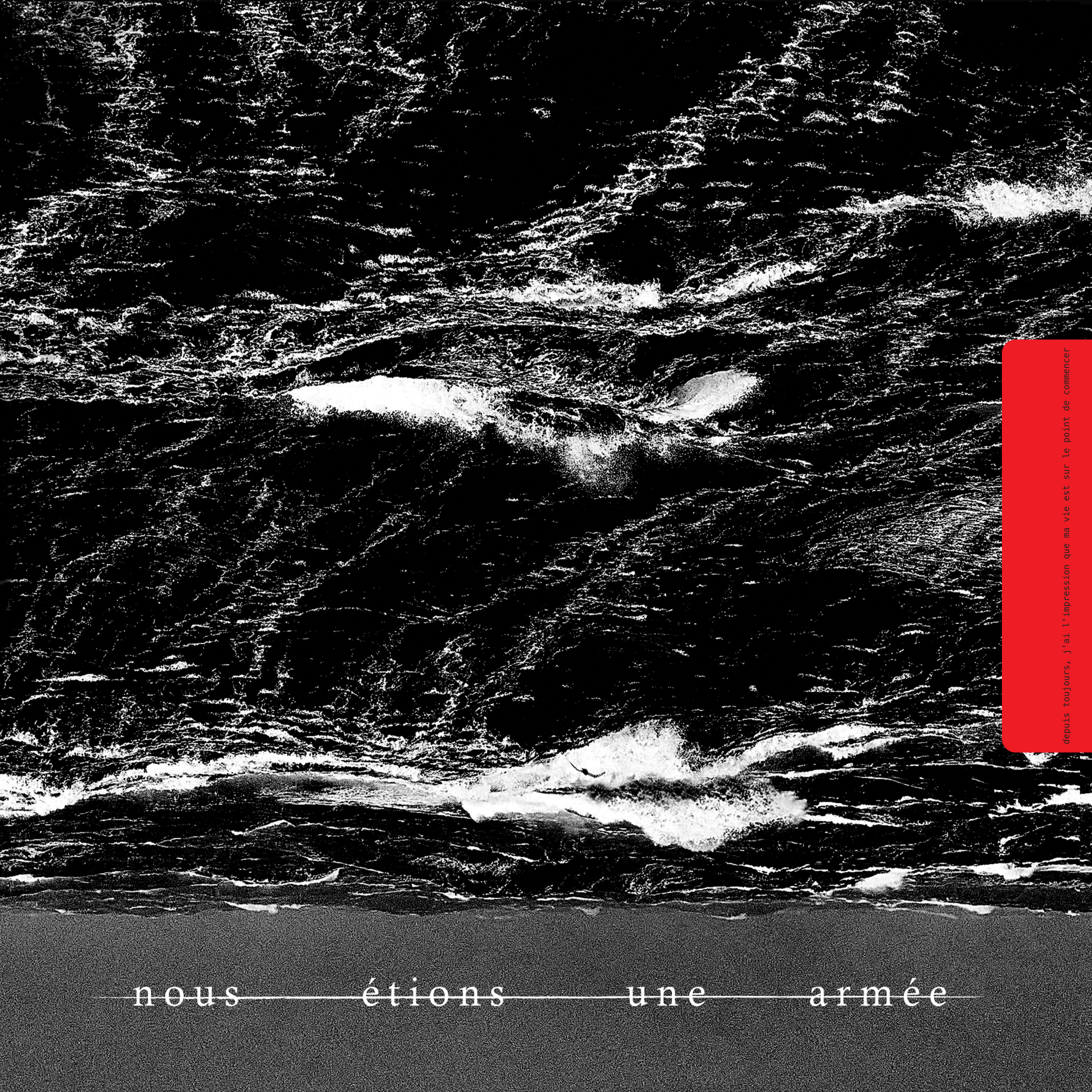
depuis toujours, j'ai l'impression que ma vie est sur le point de commencer
—
Release on 25 October 2024
—



“Nous étions une armée, ça veut dire : je suis seul. Ça veut dire : je suis seul, mais hier… Et si hier, alors demain, peut-être… Ça veut dire ça.” (We were an army, it means: I’m alone. It means: I am alone, but yesterday… And if yesterday, then tomorrow, maybe… It means this.) Nous étions une armée’s debut EP opens like this. An a cappella voice speaks to us, without melody, without artifice, without anything. It partly answers the enigma that the group has come to pose in the French musical landscape: a name that questions everyone but that no one forgets; an unspeakable style; forty concerts all over France without a single track on the platforms. The duet multiplies and asserts its contradictions. They play in the squats and bars of the post-rock scene, sharing the stage with Hint (noise rock) and Birds In Row (post-hardcore), while playing France’s biggest venues, opening for Feu! Chatterton, Benjamin Biolay (Le Liberté, La Coopérative de Mai, Paloma, Le Radiant Bellevue…), and Hervé at La Cigale. He also collaborates with the theater, composing the original music for La prochaine fois que tu mordras la poussière, adapted from Panayotis Pascot’s bestseller, directed by Paul Pascot and premiered in November 2024 at Théâtre de la Porte Saint-Martin. He signed for the live show with the giant Décibels Productions, but decided to remain entirely independent for everything else: the duo produced, recorded and mixed all their tracks themselves, and made their own videos and album covers, in an almost fraternal complicity. Beyond the paradoxes, there is above all a desire to explode the boxes, to offer radical, embodied music in French, to remain elusive.
“Non, rien n’arrive quand on l’attend.” (No, nothing happens when you expect it.) (rendez-vous)
After a highly acclaimed appearance at ïNOUIS du Printemps de Bourges, MaMA Festival, Bars en Trans and Radio France’s Hyper Weekend Festival, depuis toujours, j’ai l’impression que ma vie est sur le point de commencer is the band’s first official release. It was produced entirely by the duo, Léo Nivot and Rémi Le Taillandier, in a house in Uncey-le-Franc, a Burgundy village of 46 inhabitants.
“Il y a des secondes qui bouleversent toute une vie. Il y a des secondes qui sauvent.” (There are seconds that turn an entire life upside down. There are seconds that save.) (héros)
Nous étions une armée is first and foremost a voice speaking. And to speak to music is often to dream of breaking the boundary between art and life, by stripping the voice of the artifice of song. Without melody, without rhyme, without regular meter, the voice tries to invent its own poetics, to reach a form of supreme intimacy, close to confession. In this closeness, the texts naturally seek to resonate with the listener’s intimacy, but also with the reality all around. In a highly imagery-laden language reminiscent of Bashung and Kae Tempest, the voice seeks to provoke visions and create sensations, rather than simply expressing what it feels.
Despite the omnipresence of electronics in the form of synthesizers and drum machines reminiscent of Thom Yorke’s solo work, the tracks are above all driven by electric guitars whose melancholy evokes Mogwaï or Black Country New Road. In this very dark universe, a permanent duality exists between nostalgia for an idealized past and the quest for a future that we force ourselves to imagine as radiant. The songs are all torn between a deep melancholy and a vital impulse to resist. The band’s project is to make this paradox coexist: it’s often by accepting tragedy that we find the strength to face it.
Besieged by the memories of ‘Rendez-vous’ and ‘Pour plus tard’, La vie éternelle, for example, is built like a great prayer spoken in the future, to face the present. But the “très long voyage” of ‘Héros’, which concludes the EP, ends with a terrible, heart-rending cry: “C’est un bonheur trop grand pour moi ! Ce sont des larmes de joie !” (“It’s a happiness too big for me! These are tears of joy!”) which once again sounds like an enigma. Should we believe what the text says, or believe what its interpretation tells us?
“J’avais vécu comme si ta vie en dépendait. Il faudra mourir en héros.” (I had lived as if your life depended on it. You’ll have to die a hero.) (héros)
Moved by Nick Cave and Fontaines D.C., the duo’s stage performances are also highly embodied, with electric guitars accompanying the voice to the point of screaming. The group’s spoken-sung style imposes a certain theatricality, in the words of Antonin Artaud: “The actor must burn on the stage like a supplicant on the stake”. During these concerts with their almost sacrificial denouement, we understand that the duo’s music, if it is to touch, will touch us right in the heart.